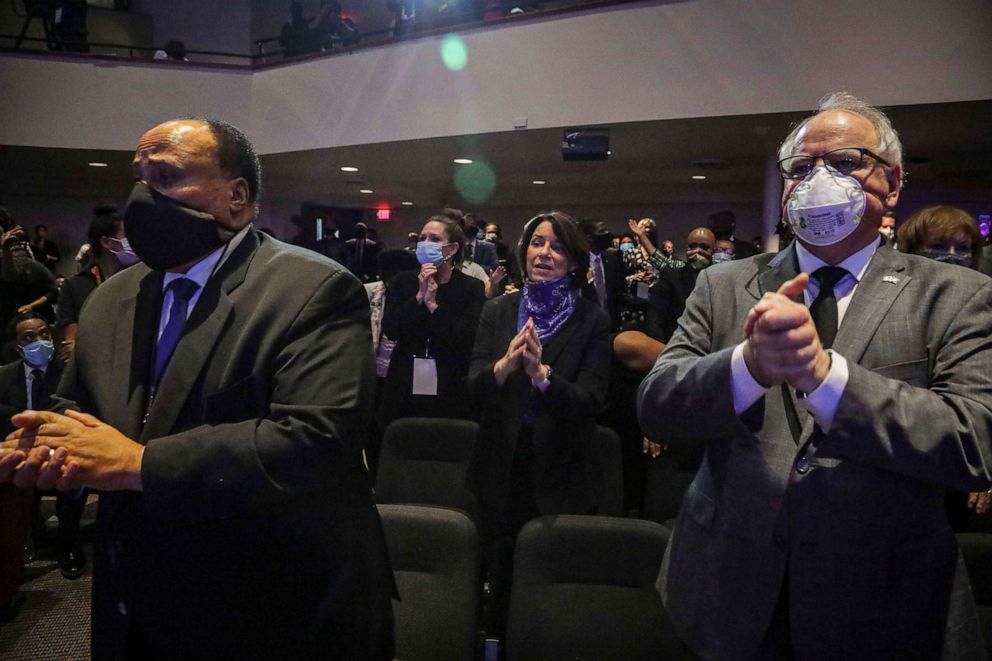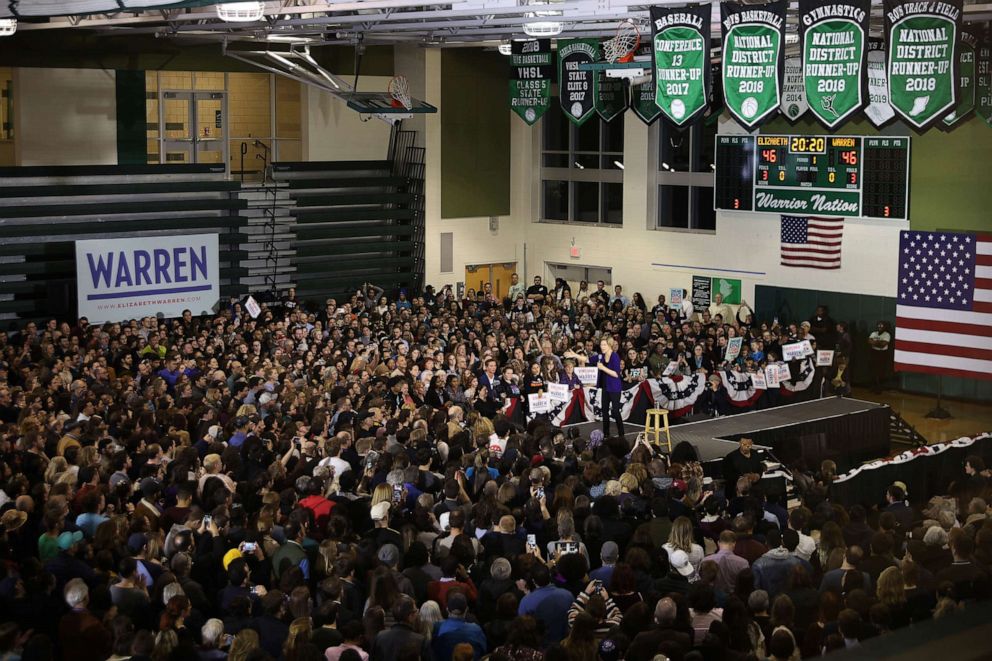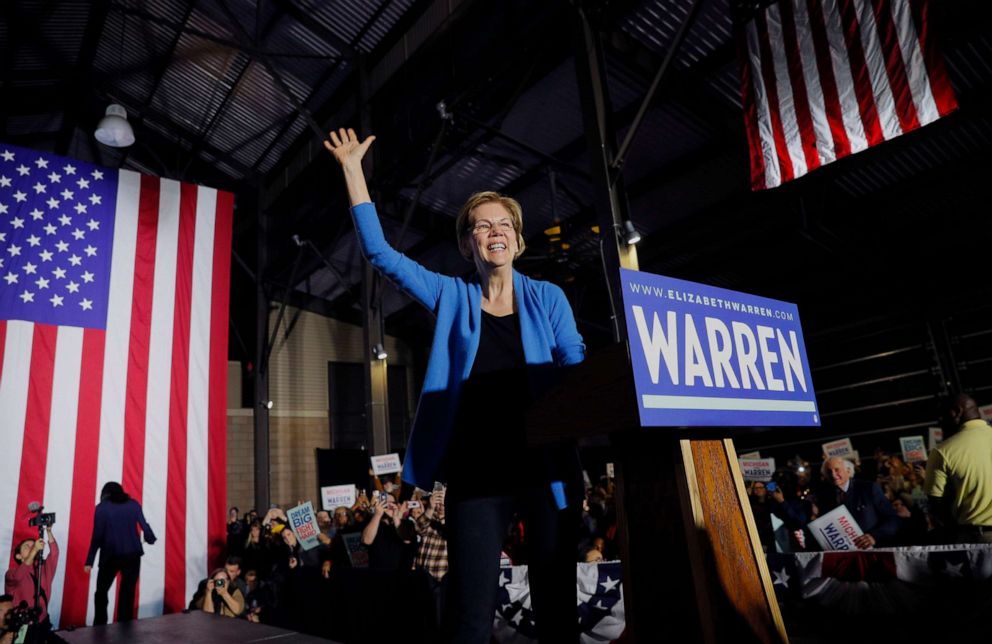Elizabeth Warren's potential as vice presidential pick shows political divisions over race in some progressive circles
Biden is facing increased calls to name a woman of color as his running mate.
As Joe Biden’s vice presidential search unfolds against a backdrop of protests over racial inequality and a push for him to choose a woman of color as his running mate, Massachusetts Sen. Elizabeth Warren--a lawmaker who has long championed economic justice policies and during the 2020 cycle advocated for “big structural change” -- has found herself in an uncomfortable position.
Warren, who has sought to be a white ally for racial justice causes on the campaign trail and in the Senate, is currently among the women presumed to be among former Vice President Biden’s running mate choices within a broader field of highly qualified women of color who are also widely thought to be in consideration for the role.
While political experts point out that one of the qualities that best positions Warren as a potential running mate is her reputation as a “fighter”, some question whether in this moment she is the best person for the Democratic Party-- which is underpinned by support from voters of color--to message that fight as Biden’s running mate.
“To pick a black woman, in and of itself would represent a response to the other side, even without words, it's having that person in there,” says Dr. Kerry Haynie, who directs Duke University’s Center for the Study of Race, Ethnicity, and Gender in the Social Sciences.
Haynie also notes that while the way President Trump is shaping his reelection campaign harkens back to the political atmosphere of the 1960s, a Democratic ticket with a Black woman on it would stand in contrast to that messaging because it could be “packaged in a way that [shows] it really is a new country and a new day.”
According to Biden’s senior adviser, Symone Sanders, the former vice president and presumptive Democratic nominee is aware of the increased calls for him to choose a woman of color as his running mate.
"He absolutely is. He hears the concerns of folks across this country who have asked for an African American woman vice president running mate, but also folks from the Latino community have said he should pick a Latina. There are folks that believe he should pick someone that represents the LGBTQ+ community," Sanders said in an appearance on ABC’s “The View” earlier this month.
During a Wednesday teleconference marking the fifth anniversary of Donald Trump’s presidential announcement, Warren acknowledged that the nation was going through “a time of tremendous crisis” and said that Americans protesting in the streets affirm “the unshakable truth that black lives matter.”
When asked by ABC News whether she thought Biden should pick a woman of color as his running mate given the current political climate, Warren indicated that she didn’t believe it was her choice to make.
“Everyone being considered for vice president is extremely qualified and would be an asset for Vice President Biden both in his campaign and in the White House. Any decision is up to Vice President Biden, whoever he chooses,” the junior Massachusetts senator stressed, adding, “I am 100% committed to doing whatever it takes to elect Joe Biden and help Democrats up and down the ticket.”
With the spotlight intensifying on Biden’s ultimate decision, the pressure is also giving way to a heightened awareness of racial disparities in politics.

During a cable news interview on Thursday, Minnesota Sen. Amy Klobuchar, who was once thought to have been among the top candidates for the role, announced that she personally called Biden on Wednesday to bow out of the process and recommended that he choose a woman of color for the job instead.
“After what I have seen in my state, what I have seen across the country, this is a historic moment and America must seize on this moment, and I truly believe -- as I actually told the vice president last night when I called him -- that I think this is a moment to put a woman of color on that ticket,” Klobuchar said, adding, “There are so many incredibly qualified women, but if you want to heal this nation right now -- my my party, yes, but our nation -- this is a hell of a way to do it.”
The catalyst for much of the nation’s recent civil unrest stemmed from the events surrounding the death of George Floyd in Klobuchar’s home state of Minnesota. Amid the fallout, the senior senator’s past public service as the Hennepin County attorney came under renewed scrutiny, and was seen by some to have diminished her vice presidential prospects. On Thursday, Klobuchar maintained that she would have “functioned fine” as a vice president despite those criticisms while also acknowledging that the fallout over Floyd’s death weighed into her decision to withdraw.
“As I sat at George Floyd's memorial, as I talked to people across the country in these last few weeks, yes, I came to this conclusion," she said.
Biden indicated support for Klobuchar’s approach with a personal callout on Twitter, saying, “Amy — from the moment you announced you were running for president in a snowstorm, it wasn't hard to see you had the grit and determination to do anything you set your mind to. You know how to get things done. With your help, we’re going to beat Donald Trump.”
But the move was also seen by some Warren supporters as a veiled swipe.
“I'm Black and want Elizabeth Warren for VP,” the Massachusetts Senator’s former press secretary, Gabrielle Farrell, tweeted on the heels of Sen. Klobuchar’s announcement. In the span of hours, hundreds of other Warren supporters appeared to follow suit with tweets of their own repeating Farrell’s sentiment.
Some of Warren's most ardent supporters recently attempted to outline why, race notwithstanding, they feel she is the best choice for the ticket.
According to a copy of a letter that was delivered to the Biden campaign last week and obtained by ABC News, a group of pro-Warren progressives urged the former vice president to choose her as his running mate and cited Warren as being uniquely qualified for the role based on her policy expertise and electability among progressives.
The letter -- written by Mark Green, a New York Democrat who once ran against Mike Bloomberg for mayor and supported Warren throughout the primary, and which is signed by public figures like actress and activist Jane Fonda and health care activist Ady Barkan-- additionally claimed Biden already has solid enough support among minority voters.

"Anyone can speculate about who could most help your ticket politically in swing mid-western states or with people of color, both areas where you're already strong. Another big variable is who could persuade millions of disappointed Sanders supporters to vote for your ticket,” the letter read.
Green insisted to ABC News the letter touting Warren was not about opposing any of the other candidates, but about individually proposing the senator as a favorable choice.
In arguing that Warren would be the best person to hold the title of first woman elected to the nation’s second highest office, Green compared Warren to Jackie Robinson -- the first African American to play major league baseball.
"Race must be on the scale of judgement but not be the only weight on the scale -- and meaning no disrespect to the incredible other women on the apparent shortlist, I thought for a couple of years that Elizabeth Warren was a once in a lifetime talent, irrespective of gender and race, and has presidential level skills and temperament like a Bill Clinton and a Barack Obama,” Green said.
“If there was going to be a first female VP potentially on a POTUS track eventually, she'd be Jackie Robinson,” he told ABC News.
The Biden campaign has not commented on the letter, and it was not coordinated with Sen. Warren or her office.
The timing of the call to have Warren join Biden’s ticket amid an ongoing national discourse over racial injustice was largely met with pushback from a number of political experts, as well as supporters of the women of color who are also thought to be in the running.
Some supporters of Sen. Kamala Harris in particular indicated that they thought the letter opened the door to implications that Harris -- the second black woman to serve in the Senate and a former California attorney general -- had insufficient qualifications to be a top contender.
Jalisa Washington-Price, a Democratic Strategist who served as the Harris’s South Carolina state director and national deputy political director, weighed in on a Twitter conversation discussing the implications of questioning the “qualifications” of the women of color considered possible vice presidential candidates and how those questions are concerning to some given the context of a primary season that was ultimately dominated by two, white men.
“The same tactic so call “allies” [used] in these progress/democratic committees, campaigns & political firms to justify not promoting or hiring [women of color,]” Washington-Price tweeted.
In an interview with ABC News last week, Green defended the timing of the letter and volunteered the information that one-fifth of those who signed the letter addressed to the Biden campaign are people of color.
Green said the release of the letter was already pushed back amid the political climate, and felt enough time had been given to "respect" the current protests.
"At this point, it's a bad look to say you cannot argue for a leading contender during the month of judgement while the public is understandably focused on racial injustice...so while there's no perfect time, this paid due respect to the four weeks since George Floyd was lynched," Green said.
The letter, in many ways, embodied what some of its critics see as paternalistic undercurrents in factions of progressive movements.
“Politically, those people who wrote that letter [...] put [Warren] in the position of having to defend that, and that's not a good place to be,” Karen Finney, a Democratic political consultant and former senior adviser to Hillary Clinton and Stacey Abrams said in an interview with ABC News in response to the public publication of the letter.
“It seemed very tone deaf given what's happening in the country right now, and, you know, for a group of mostly white people -- I know they consider themselves progressives -- but this is a problem in the progressive movement quite frankly, if we're going to be honest,” she said.
“There are a couple of places where they talk about racial inequality and systemic racism [in the letter] and their argument is that [Warren is] the most qualified, and to suggest that she might know more about these issues than the black women who are being considered was on its face offensive,” Finney added.
Finney drew a contrast to the phrasing included in a letter she cosigned with a group of Black women leaders in April, in hopes of urging Biden to choose a woman of color as his running mate. According to Finney, the group of women took special care to ensure that their phrasing would not give the impression that they were disparaging any of the other women surmised to be under consideration.
The letter highlighted the impact Black women have on the political success of the Democratic party and touted the accomplishments of all of the Black women who are presumed vice presidential contenders. Finney says that type of context was not evident in the letter sent by the group of Warren supporters.
“[Having] a pervasive attitude of just ‘well if we just pass progressive policies that's going to help black people’ — you know that's like saying 'well if we just pass certain policies, it's gonna help women.' No, you have to be intentional,” Finney explained regarding why some Black voters feel like the progressive movement does not fully encompass their political needs.
The framing of the letter also highlights the complicated nature of racial allyship in the political sphere by creating an implication that people of color cannot be objective in addressing racial issues, Haynie said.
“It’s a big problem with so-called allies of people of color — that I can't talk about race because I have some good investment in it because of my race, but they could be, quote unquote, ‘objective’ commentators on race,” he said in an interview with ABC News on Friday. “It is that insinuation that's a long-standing thing that we fight against -- that, you know, she’s in a better position to be objective and not emotional and certainly not self-interested in talking about race,” he added.
On the campaign trail, Warren addressed the nation’s racial disparities in her “Working Agenda for Black America.” The plan sought to “recognize the systemic discrimination that infects our country” and urged supporters to “work actively - and deliberately - to root it out and set us on a better path.” The agenda largely drew from other components of Warren’s policy platform and identified how various aspects of plans like ‘Medicare For All’ would positively impact Black communities, if implemented.
Warren’s efforts with black voters on the campaign trail were largely overshadowed by Biden and Vermont Sen. Bernie Sanders. Leading into the first contests of the primary cycle, Biden enjoyed especially broad support among blacks, 51%, versus 15% for Sanders. The rest of the candidates at the time -- including Warren -- were in single digits with the important Democratic demographic which accounted for 25% of Democratic primary voters in 2016, based on results in the 27 states where exit polls were conducted.
Despite the lack of tangible support on the campaign trail, Warren continued to champion policies she thought would be beneficial to Black and communities of color after bowing out of the primary. As the effects of coronavirus began manifesting across the country, the Massachusetts senator sought to bring some of her campaign policy ideas to the Senate, and in doing so, brought attention to the disproportionate rate at which the pandemic was affecting communities of color -- especially in terms of maternal health care.
“The data shows that Black women are three to four times more likely than white women to die from pregnancy or childbirth-related causes. This trend persists even after adjusting for income and education. One major reason? Racism,” Warren wrote in an op-ed in Essence, while adding that she supported similar legislative efforts by her colleagues and former 2020 rivals Sen. Kamala Harris and Sen. Corey Booker.
In recent weeks, Warren also took to the streets to join protesters demonstrating against police brutality outside the White House, and is currently leading an effort to create an amendment to the 2021 Defense Authorization Bill that would require military bases named after Confederate soldiers to change their names, which the House is likely to consider.
That move put Warren on a collision course with President Trump who lashed out at Warren on Twitter by taunting the senator with the racially-offensive nickname, “Pocahontas,” a disparaging comment that references a historical figure often revered for her role as a Colonial-era emissary and leader of her people. The nickname used by Trump -- who views Warren as a political adversary and lobbed similar attacks when she was a presidential candidate -- references Warren's false claim to Native American heritage and has dogged Warren since her 2012 Senate race. She has since apologized to the Cherokee Nation for her decision to take a DNA test to prove that she had Native American history.

Warren remains undeterred and ready to push back heading toward November. This month, the junior senator from Massachusetts issued a slew of down ballot endorsements and brought in $6 million for the Biden campaign in its best fundraising haul to date.
According to Larry Sabato, a political scientist and the director of the University of Virginia Center for Politics, Warren’s top selling points as a vice president would be that she is a “seen as a fighter.”
“As somebody who would stand up for principle -- and Biden is seen as more inclined to compromise, which can be a plus actually in this election — she complements that,” Sabato said in an interview with ABC News, while adding that Warren would not complement Biden in terms of race, and also age.
Unlike past campaigns in which vice presidents typically captured the attention of the electorate for fleeting moments, Sabato says this year, Biden’s age will likely play a factor in distinguishing the role of whomever he picks as his running mate. If elected, Biden -- who turns 78 in November -- would be the oldest president to hold office.
“You have to pick somebody that Democrats and Independents — forget about Republicans — will instantly see as a potential president,” Sabato said.
“It's already gonna be history-making with a woman if he wins, it could be even more history-making if it's a minority woman and he wins, or even if it's just a minority woman nominee,” he added.
Given ongoing developments in the nation’s cultural context, Sabato says the idea of a “reverse Obama-Biden ticket” has settled among many in the electorate.
“Once that expectation settles in and becomes a part of, kind of an unspoken consensus, it's very difficult to break out of it,” he said.
ABC News' Cheyenne Haslett contributed to this report.




